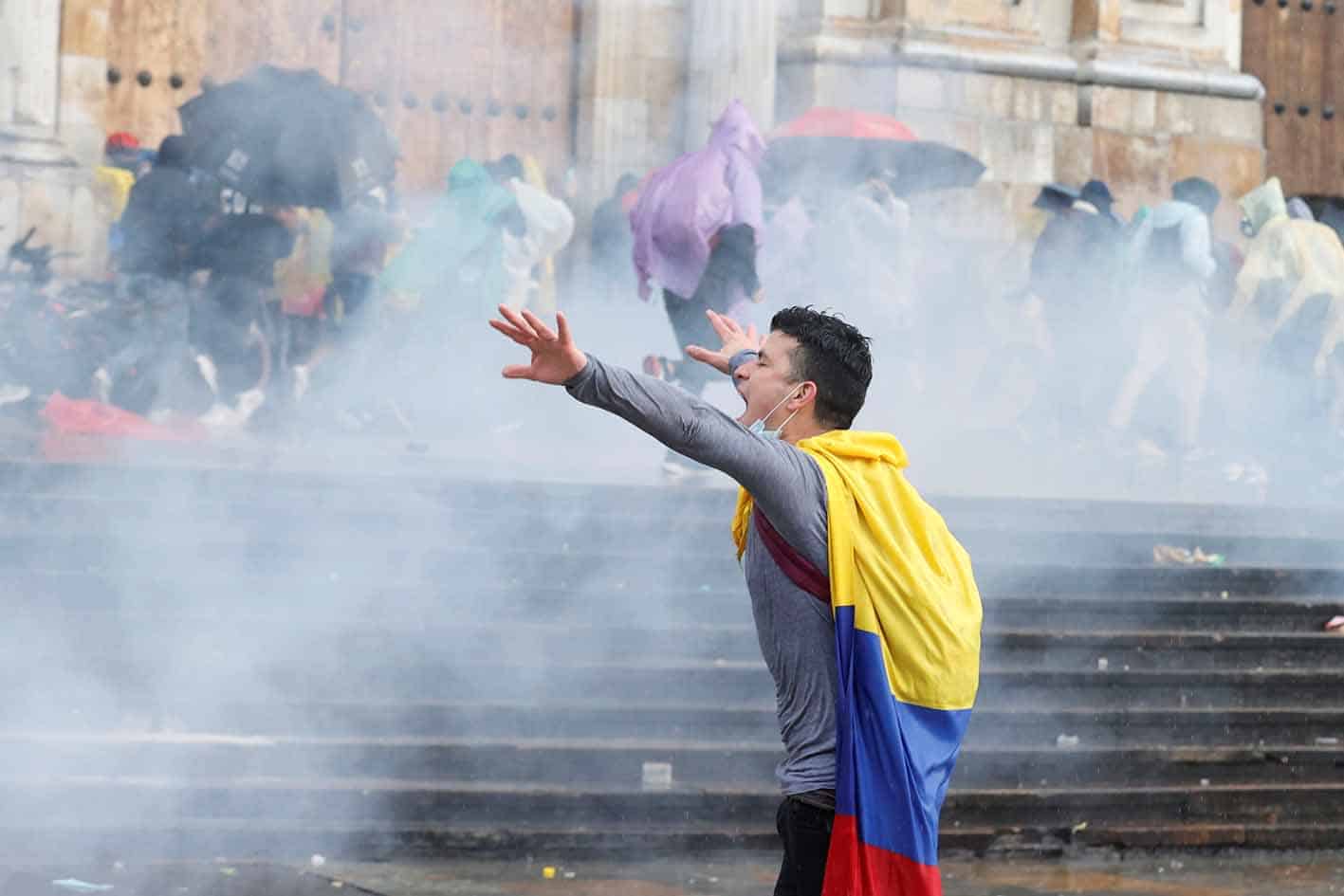Article, FEATURED STORIES, WORLD
Over 40 Civilians Killed During Colombian Protests

Photo Credit/EFE/Mauricio Dueñas Castañeda
Dissent in Colombia shows no signs of slowing down as the country endures its third week of public protests. Thousands of civilians initially took to the streets to express dissatisfaction with the government’s lackluster attempt at addressing the repercussions of the COVID-19 pandemic. Prominent demands included economic assistance in the form of income plans and free tuition at public universities.
The narrative transformed when police response to peaceful protests escalated in violence and repression. As a result, anti-government sentiments intensified and refocused on police reform.
“The demonstrations are taking other directions, not only because of the power of citizen mobilization but also because of the needs that afflict the country,” said Sebastián Lanz, co-director of Temblores, an organization that tracks police violence. “One of these is police violence.”
Public demands extended to include solutions for poverty, inequality, and the health care crisis. Demonstrations have disrupted daily operations in major cities, including Cali and Medellin, further jeopardizing their ability to deal with pandemic-related complications.
PUBLIC OUTCRY SPARKED BY TAX PROPOSAL
Demonstrations began on April 28, 2021, in response to a tax reform measure posed by President Iván Duque. Colombia’s poverty and employment rates are higher than ever, with poverty rising by 6.5% in the past year. The $6.7 billion tax plan sought to fix the economic imbalance exacerbated by the pandemic.
Instead of providing relief to Colombia’s citizens, the proposal included disadvantageous measures that hurt those in need the most, such as an increase in taxes on gasoline, utilities, and household products such as milk, eggs, and meat.
Though the tax proposal was regrettably withdrawn on May 2, followed by the finance minister’s resignation, the damage had already been done. As a country, Columbia has suffered tremendously from a history of political unrest. The tax plan sparked public indignation over deep-seated issues of inequality and police violence.
INCREASING DEATH TOLL HIGHLIGHTS BRUTALITY
Global sources report that over 40 deaths have been caused by police brutality during the demonstrations. According to Colombia’s human rights ombudsman, 168 people have also been reported missing. However, the ombudsman contends that not all of the killings were directly related to the protests.
President Duque similarly repudiates claims of excessive police brutality. “There have been acts of abuse of force,” Duque said. “[J]ust saying that there could be any possibility that the Colombian police will be seen as a systematic abuser of human rights — well, that will be not only unfair, unjust but without any base, any ground.”
Numerous documentation and accounts of police brutality have surfaced, including video evidence. One protestor claimed he was forced to drink urine after being detained and beaten.
“We have watched the increasing violence with extreme concern,” said Alejandro Lanz, co-director of Temblores in Bogotá. “Most of the victims we have registered have been young people who were protesting peacefully. There is no guarantee of life for anyone.”
DEMONSTRATIONS CONFLICT WITH PANDEMIC CONTROL
In addition to the abhorrent violence, the ongoing protests spell bad news for anti-pandemic measures. Considering vaccination scarcity in Columbia, large congregations are particularly dangerous for the spread of the disease.
Cali is currently experiencing its third peak in COVID-19 cases, with ICUs at 85 to 95% occupancy. According to a hospital doctor, they have been forced to cancel ambulatory consultations and surgeries. He said, “We are only seeing emergencies and are operating at perhaps 10% capacity.”
With healthcare facilities already strained, road blockades and crowded streets inhibit the efforts of emergency responders and the transportation of essential resources. All healthcare professionals can do is put forth their best efforts to accommodate the increased risks incurred by group protests.
ICUs in Medellin has been at or near full capacity for weeks. Health secretary Andree Uribe divulged that the city is preparing for a potential crisis. “We know there will be an increase in cases; we’re on alert; we are carrying out actions for early identification, like testing everyone who participated in the marches,” she said.
GOVERNMENT RESPONSE TO CIVIL UNREST
Beyond canceling tax reform measures, President Duque has expressed support for peaceful protest. Duque professed that violence against protest victims should be investigated and punished.
Contrarily, he denied the need for police reform and tried to minimize the extent of police misconduct. Defense Minister Diego Molano blamed political unrest on government-identified terrorist groups, citing people shooting at officers.
Molano said, “Criminal organizations are behind the violent acts that tarnish peaceful protest.” His claims contradict reports of police violence during unarmed, peaceful protests.
To save face, the government will be fulfilling the request for free tuition for poor and working-class students attending public universities and technical schools. The reparation only applies to the following semester.
During a press conference on Sunday, May 9, Duque proclaimed, “We have to utilize these moments, which have caused us so much pain. We have to convert this moment into an opportunity as a country. . .we have to build a pact for the youth with the youth.”

